Surfshark vs. NordVPN
While Surfshark is more affordable, our tests show that NordVPN is faster and has more security features.


 Aliza Vigderman, Senior Editor, Industry Analyst
&
Aliza Vigderman, Senior Editor, Industry Analyst
&
 Gabe Turner, Chief Editor
Last Updated on Apr 14, 2025
Gabe Turner, Chief Editor
Last Updated on Apr 14, 2025

- A two-year plan currently costs just $3.09 per month.
- Multi-hop feature routes connection through two VPN servers and two layers of encryption.
- Over 8,000 servers spread across 126 international locations.

- No-logs VPN company based in the Virgin Islands
- Allows unlimited connections, double VPN, and split tunneling
- Choice of OpenVPN, WireGuard, and IKEv2

Surfshark and NordVPN are undoubtedly great VPNs which makes it difficult to figure out which one’s better. So, to help you compare these two VPNs, we tested them side by side. We spent more than 50 hours testing Surfshark and NordVPN on our smartphones, tablets, computers, and smart TVs.
We found that as a VPN, NordVPN offers better features and has a more established network. It has more servers than Surfshark, and it’s overall better when it comes to speed, streaming, torrenting, and gaming. It also offers more comprehensive bundles, even though it lacks antivirus software as full-featured as the Surfshark antivirus.
Surfshark, on the other hand, is more user-friendly. The Dynamic MultiHop and more customizable split tunneling are examples of how user-centric Surfshark is. It’s also more affordable, especially if you’re looking for a VPN for long-term use.
Now let’s dig into the details for a complete comparison of NordVPN and Surfshark.
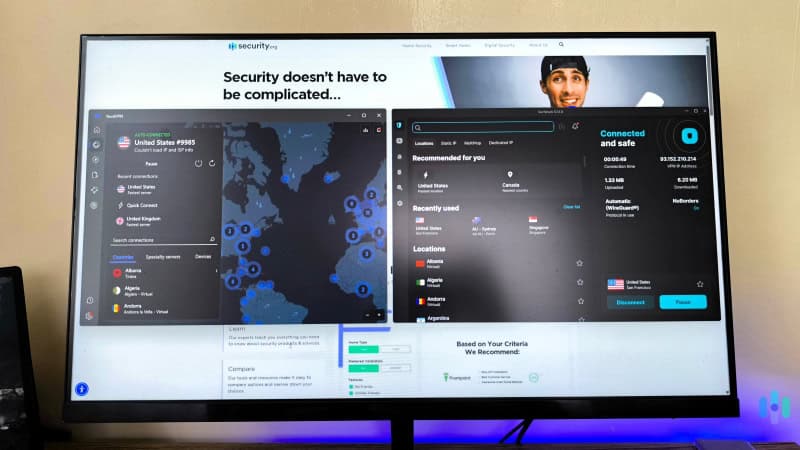

NordVPN
View Plans
Links to NordVPN
|

Surfshark
View Plans
Links to Surfshark
|
|
|---|---|---|
| Server network | 3,200+ in 100 countries | 7,200+ in 118 countries |
| VPN protocols | OpenVPN, WireGuard | OpenVPN, NordLynx (WireGuard-based), NordWhisper |
| Average download speed loss* | 7.8% | 5.8% |
| Average upload speed loss* | 49.9% | 4.1% |
| Kill switch | Yes | Yes |
| Double-hop | Yes (Dynamic MultiHop) | Yes (Double VPN) |
| P2P-optimized servers | All servers | Select servers in 114 countries |
| Streaming-optimized servers | All servers | All servers |
| Obfuscated servers | All servers (Camouflage mode) | Select servers in 16 countries |
| RAM-based servers | All servers | All servers |
| Extra features |
|
|
Servers
Let’s start with a general overview. NordVPN has a much bigger footprint than Surfshark, with over 7,200 servers as opposed to just over 3,200. It’s a closer competition when it comes to server locations, but NordVPN still wins by a hair. Surfshark offers servers in 100 countries, while NordVPN offers servers in 118 countries.
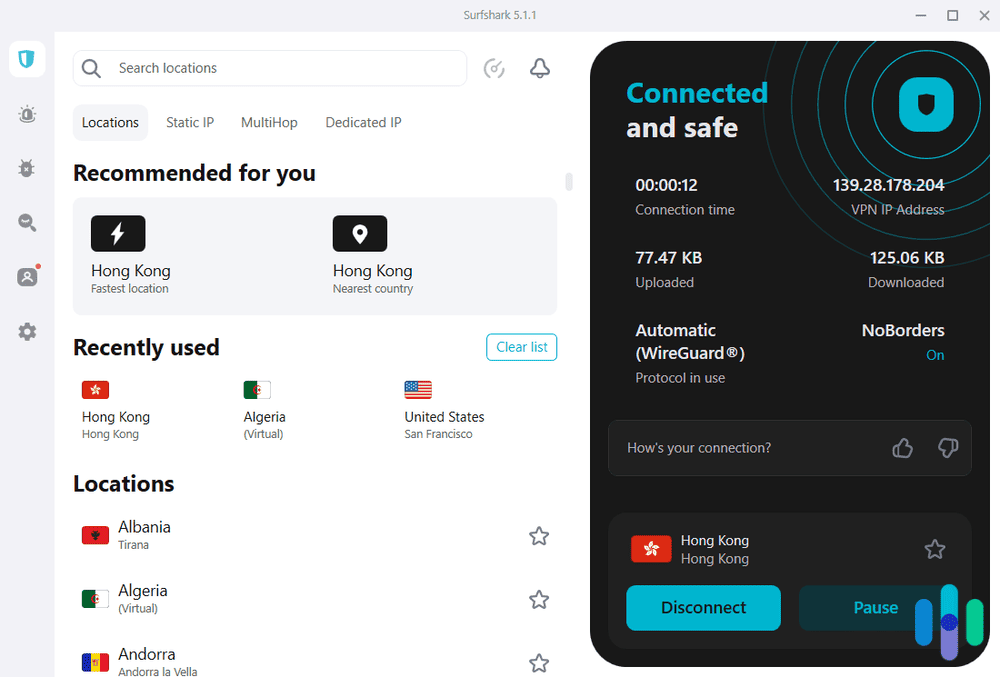
With more servers, we reasonably expect NordVPN to provide better connections. Using Surfshark should be like driving down a three-lane highway, while NordVPN has six lanes. Since NordVPN offers more server options, it’s less likely to have a buildup of user traffic, which could result in faster speeds.
NordVPN also offers more server locations, which means it’s a great VPN for traveling. No matter where in the world you go, there’s a good chance that you’ll find a server nearby. That also means it’s a great VPN for streaming because it can give you more countries to connect to. That’s not to say that Surfshark is bad — having servers in 100 countries is still impressive — but NordVPN takes the cake here.
Tip: Before you buy any VPN, be sure to check out its list of servers and make sure it’s available in your country, with servers close to where you’ll be using the VPN.
Privacy
Given the ubiquity of security breaches and hackings, it’s no surprise that nearly 80 percent of Americans say they are concerned about how much personal data companies collect from them.1 If data collection is a bug, then VPNs are the bug spray meant to eradicate online tracking, allowing users to stay private online. How do Surfshark and NordVPN stack up in terms of privacy?
Privacy Jurisdiction
Where a VPN company is located can affect how well it protects your data. For example, NordVPN is based in Panama, which is known for its strict consumer privacy laws and lax data retention laws. On top of that, Panama is outside the jurisdiction of the Five, Nine, and 14 Eyes, which are multinational alliances that share communication intelligence with each other. (The U.S. is a prominent member of the alliance).
Surfshark, on the other hand, is based in the Netherlands. While it’s generally privacy-friendly, being under EU regulations, it’s part of the Nine Eyes. That means the government can ask Surfshark to provide customer data, and Surfshark will have no option but to comply. To combat this risk, Surfshark uses a no-logs privacy policy, which means they shouldn’t have any data to hand over if a government asks Surfshark for customer data. It’s outlined in their privacy policy.
Privacy Policies
That thing about Surfshark’s legal obligation to the Netherlands government can be quite concerning, but nonetheless, Surfshark can only provide data it has collected. So let’s see and compare what types of data Surfshark and NordVPN collect.
- What NordVPN and SurfShark both log: Email address, payment data, application diagnostics such as crash error reports
- What NordVPN logs that Surfshark doesn’t: IP address of the device used for payment, server load information, username, timestamp of last session status, whether or not the user has connected in the past 30 days, information about in-app events, device model, operating system version, device identifiers
- What Surfshark logs that NordVPN doesn’t: Encrypted password, IP address of devices used to access VPN service (but in an anonymized format)
- What neither logs: Web activity
FYI: You can prevent Surfshark and NordVPN from storing your payment information by paying with cryptocurrency instead of a credit card. They also happen to be two of the best VPNs for crypto traders who want some extra privacy and security.
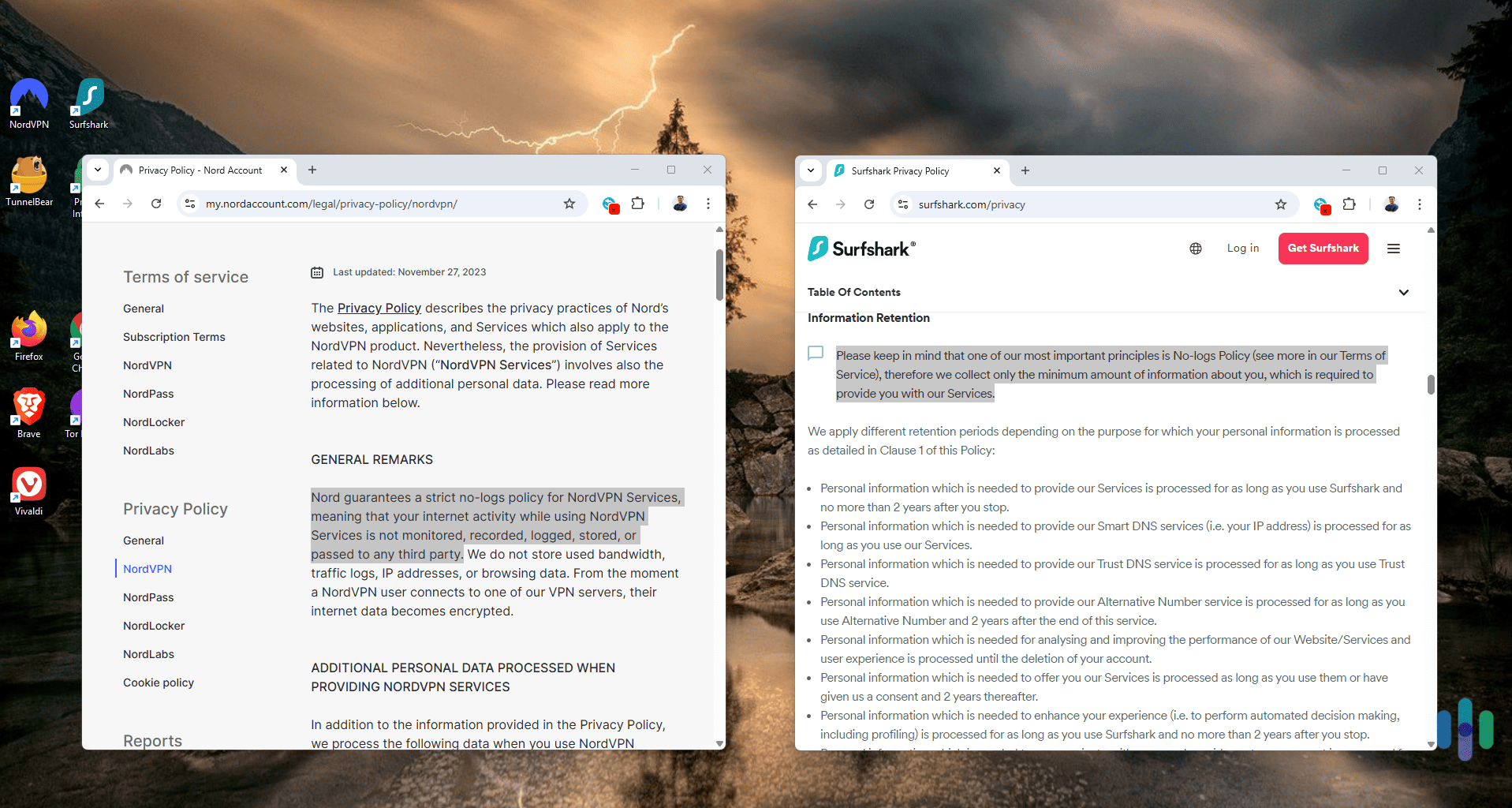
While Surfshark logs fewer types of data than NordVPN, we found their policy about logging IP addresses concerning. Surfshark records the IP address of a device connected to its VPN service, but it also has a system in place that removes that data less than 15 minutes after disconnecting. In our book, that’s still secure. Surfshark’s subjected themselves to third-party audits confirming this practice as well. Moreover, since neither NordVPN nor Surfshark records web activity, your browsing history should still be safe with both providers.
Pro Tip: If NordVPN isn’t right for your needs, check out the best NordVPN alternatives. (Hint: Surfshark makes the list!)
Comparing Surfshark and NordVPN Features
Now it’s time to see how Surfshark and NordVPN compare in terms of what we got with their VPN service. While our Surfshark review and our NordVPN review go into more detail, here’s a general overview.
Encryption Methods
Both VPNs use a number of encryption methods depending on the type of connection. By default, both VPNs automatically pick the best VPN protocol for each connection — either OpenVPN or WireGuard.
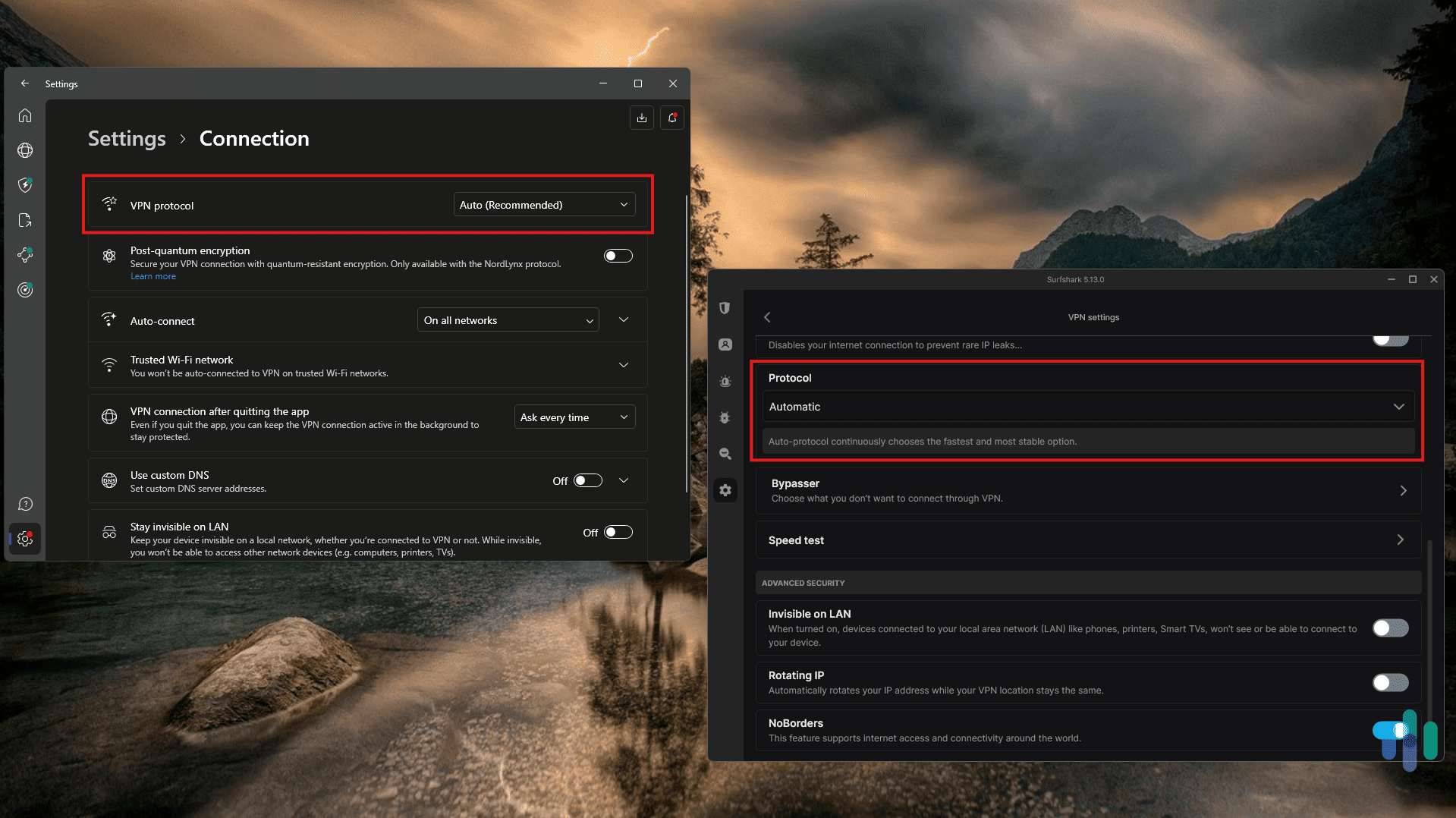
If your device connects via OpenVPN, it would use 256-bit AES encryption, which is the industry gold standard. If your device uses WireGuard, it would encrypt your traffic using ChaCha20, which is a more modern and very secure encryption standard.
Both Surfshark and NordVPN also offer double encryption when you double-hop your connection. Your traffic is encrypted twice by passing through two VPN servers. We found Surfshark’s double-hop (“Dynamic MultiHop”) slightly better because it allows customizations. You can choose the two servers through which your traffic is routed. With NordVPN, only 10 pre-set “Double VPN” servers are available.
Expert Tip: Turning on double-hop will slow down your connection, but you can take advantage of Surfshark’s Dynamic MultiHop to improve speeds. When we use this feature, we choose an entry server close to our location to minimize the distance our traffic needs to travel.
Kill Switch
The kill switch is a network feature that disables your device’s outgoing and incoming connections when your VPN drops unexpectedly. It’s one of our non-negotiable VPN features — every top-rated VPN needs to have a kill switch. And yes, both Surfshark and NordVPN have a kill switch. We also found that their kill switches work the same way.
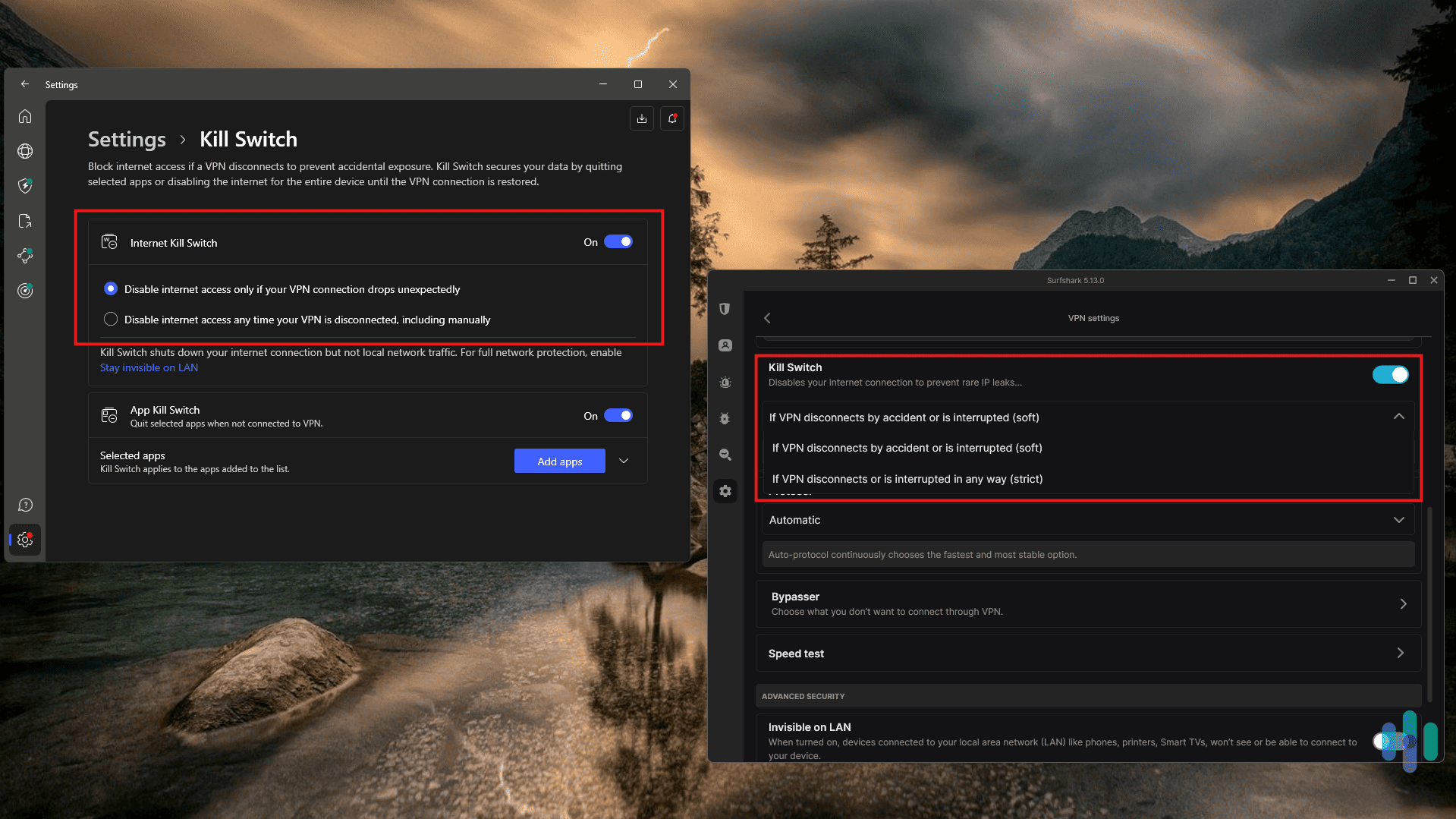
With both VPNs, you can choose whether you want the kill switch to activate only when the VPN connection drops unexpectedly, or anytime the VPN disconnects for whatever reason. We don’t have a preference, but we appreciate that Surfshark and NordVPN give users options. Just note that the type of kill switch you’ll have access to depends on your device. Androids, for example, support only the latter type of kill switch (a.k.a. always-on VPN).
>> Read More: The Best Android VPNs in 2025
Split Tunneling
Another area where there’s an overlap between Surfshark and NordVPN is split tunneling. Essentially, split tunneling creates two network connections. One passes through normal tunnels, as if you’re using the internet without a VPN. The other is the VPN tunnel.
Split tunneling is useful for multi-tasking — for example, we can check local weather updates even when using a VPN because the regular tunnel isn’t hiding our real IP address and location.
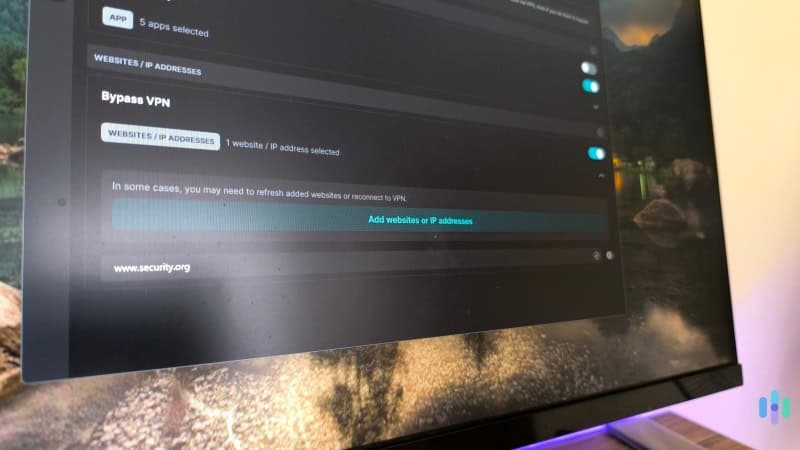
Surfshark’s desktop split tunneling works slightly better than NordVPN, though. NordVPN’s desktop split tunneling only lets you exclude third-party apps from the VPN tunnel. For example, if you want to browse the web using the regular tunnel, you’d have to exclude the entire browser. That means all your browsing will not go through the encrypted tunnel.
With Surfshark, you can exclude certain websites and IP addresses. Let’s say you want Netflix to see your real location so you can continue watching your favorite show while you download torrent using a VPN — simply enter Netflix’s URL in the Surfshark app’s bypass VPN menu.
>> Related: The Best VPNs for Netflix Streaming in 2025
Torrenting and Streaming
Did you know that the average American spends nearly three hours a day watching television?2 We’ll be honest: that number sounded kind of low to us, especially with all of the streaming and torrenting options available. Using a VPN can enhance your streaming and torrenting experience while also protecting you from bad actors such as snoopers using torrenting networks to victimize users.
For torrenting, having servers that support peer-to-peer (P2P) connections is essential. These servers allow you to directly connect to seeders, improving download speeds. We learned that all 100 server locations (countries) of Surfshark have P2P support. Still, we find NordVPN better because, although four of its locations don’t have P2P servers, the remaining 114 locations are still more than Surfshark offers. Not to mention, NordVPN’s upload speeds were faster in our tests, which makes it great for seeding torrents.
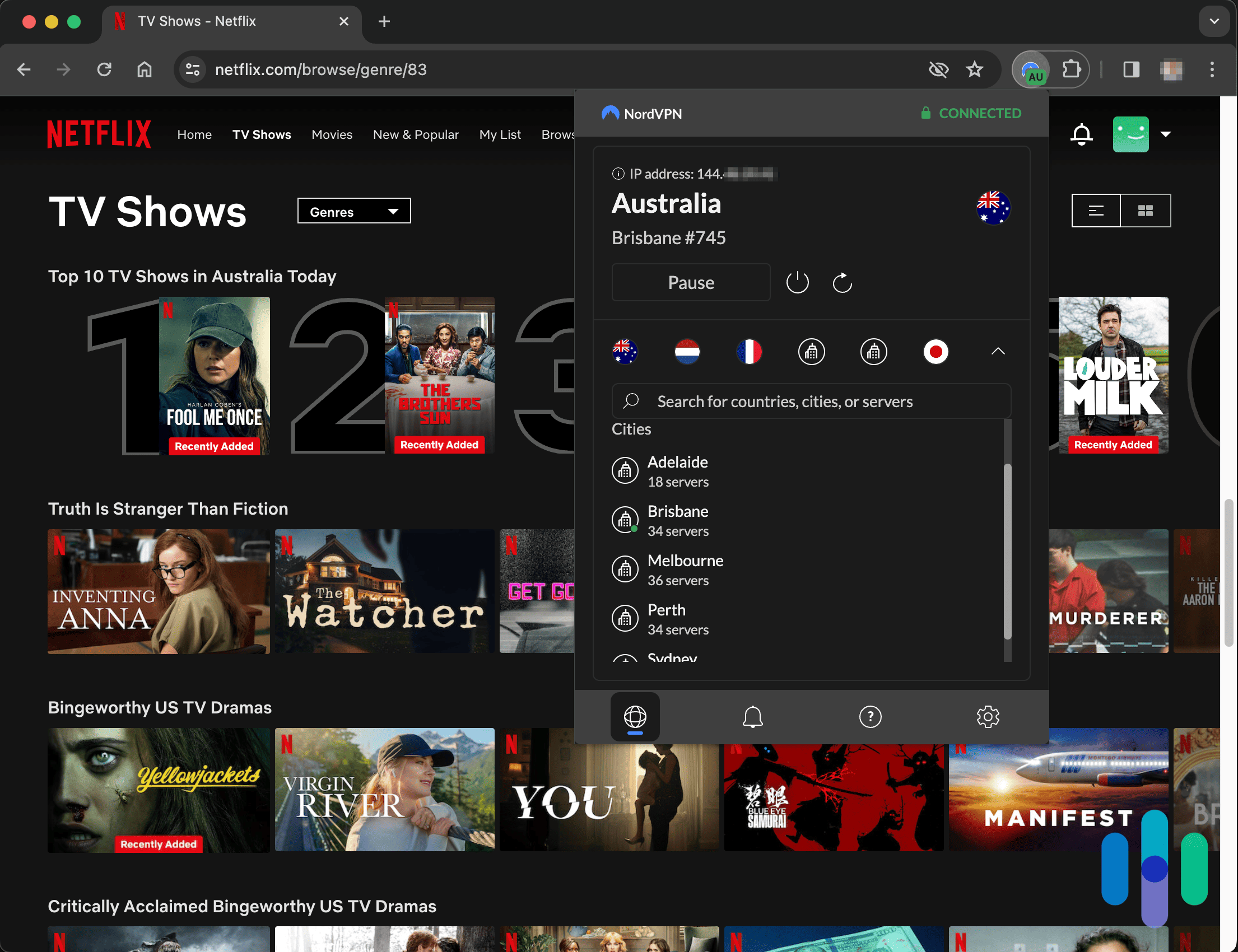
As for streaming, particularly Netflix, Surfshark and NordVPN are on equal grounds. We had no problem accessing Netflix while connected to either VPN. Their download speeds also allowed for buffer-free 4K streaming.
That being said, because NordVPN offers more server locations (118 countries), it may be able to unlock more streaming options for you. We also find it more reliable for unblocking streaming services that are more stringent than Netflix in detecting VPN users. NordVPN topped our list of the best VPNs for Disney+, for example. It was able to evade Disney+ detection seven out of 10 times, while Surfshark was slightly worse off with a 60% success rate (six out of 10).
FYI: We attribute NordVPN’s higher success rate in accessing streaming sites to its larger server network. Streaming services detect VPNs by detecting known VPN IP addresses. If a server’s IP address is on their database, they won’t let it through. Because it has more servers, NordVPN has more IP addresses available to users.
Comparing Surfshark and NordVPN Speeds
There’s undoubtedly a lot of important features and aspects to look at when comparing VPNs, but speed is one of the top priorities. All of the VPNs we recommend are fast, but some are faster than others. So, we ran a few speed tests to see which VPN is faster — Surfshark or NordVPN?
Here’s what we did:
- We tested the speed of our wired internet connection to set our baseline internet speed when not connected to a VPN. For good measure, we ran three tests and averaged the results.
- We then connected to each VPN, and ran 10 speed tests while connected to a server in Australia. We average the results of those 10 tests.
- Lastly, we computed the percentage by which our upload and download speed dropped after connecting to the VPN.
| Speed Test Results | Surfshark | NordVPN |
|---|---|---|
| Download speed loss | 7.8% | 5.8% |
| Upload speed loss | 50% | 4.1% |
| Latency (ping) | 136 ms | 78 ms |
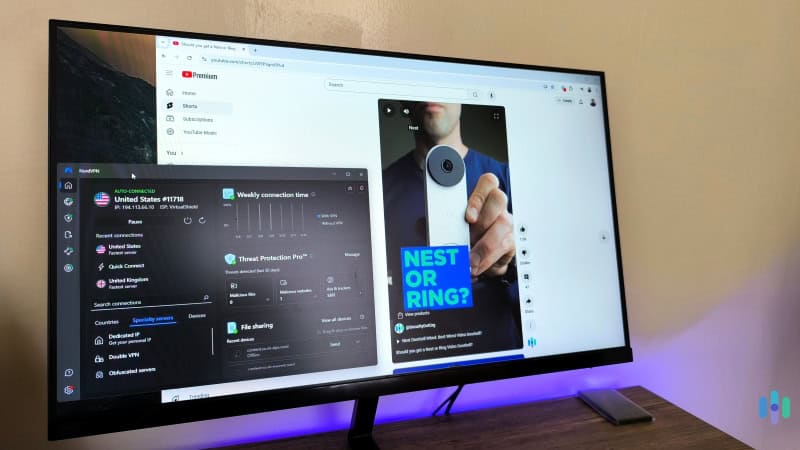
It was a close game between Surfshark and NordVPN in terms of the download speed. Both slowed us down by less than 10%, and that’s a good number. We never experienced any video buffering, and our downloads remained fast. We also had no problem scrolling through TikTok videos and watching YouTube Shorts.
The upload speed was a different story. Surfshark was much slower in this category, dropping our upload speed by half. As you might expect, this affected how long it took to upload videos to our YouTube channel.
We also saw a big difference in the latency, the amount of time it takes for traffic to get from one point to another. We connected both VPNs to Australia, so we expected a sharp increase because of the distance, but we didn’t expect Surfshark’s latency to spike up to 136 ms. A low latency (80 ms or less) is important for gaming, so if you’re looking for a gaming VPN, we’d recommend NordVPN over Surfshark.
Pro Tip: To be fair, though, we still consider Surfshark fast. We listed it as one of the fastest VPNs, particularly for streaming — it may not have great upload speeds, but it offers fast download speeds.
Putting Surfshark and NordVPN Through Security Tests
We didn’t test only for speed, though. Speed and security should go hand-in-hand, so we also ran some leak tests to ensure Surfshark and NordVPN are hiding our IP addresses well from snoopers, hackers, and government spying.
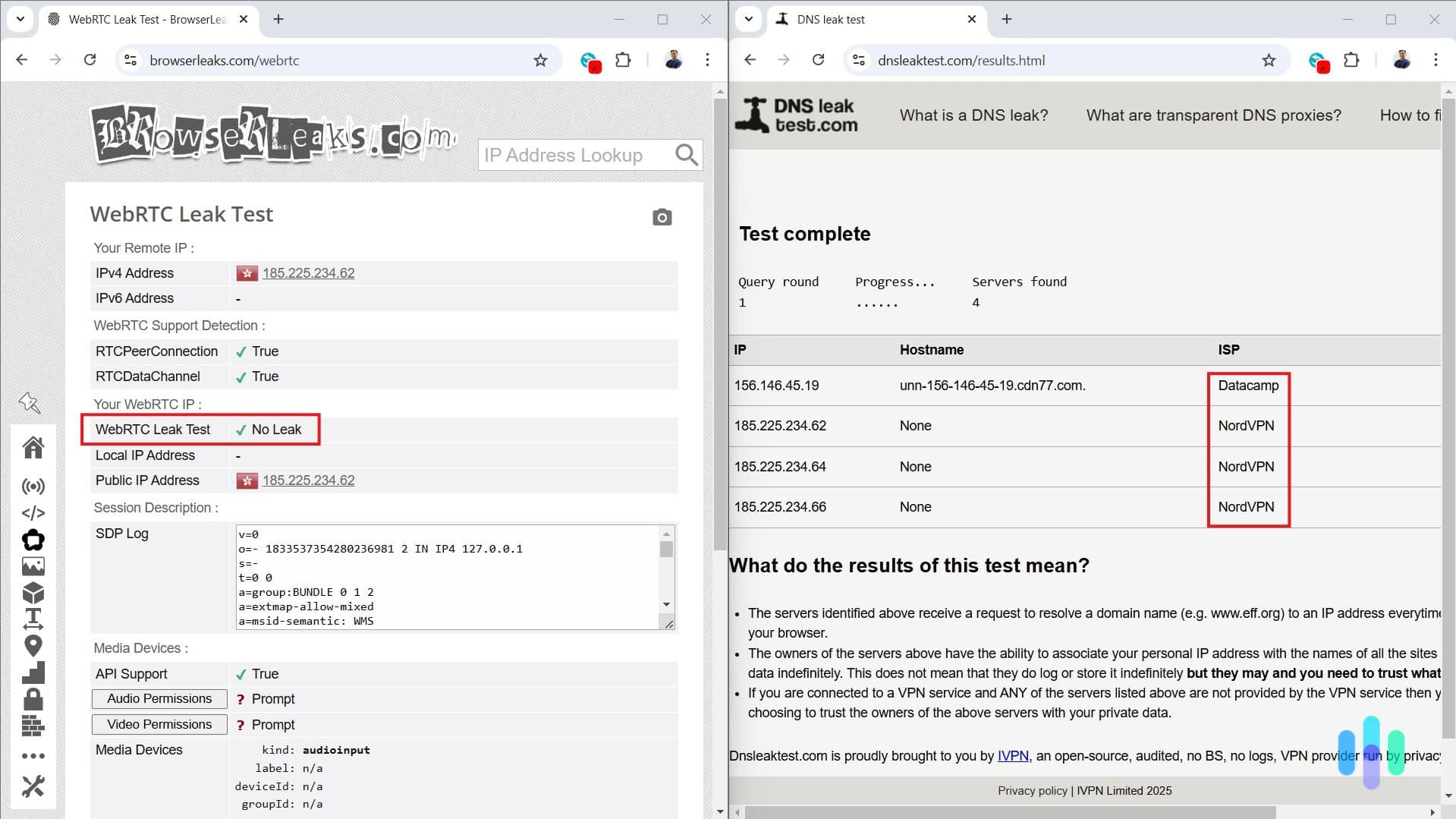
DNS Leaks
DNS, which stands for domain name server, is the name of a website. It’s the URL you type into your browser when navigating the web, such as security.org. That URL directs your traffic to a specific IP address. We like to think of a website’s DNS as the way we’d describe a house’s location like “the red house on the corner” while the IP address is the house’s mailing address.
Here’s the thing: Every search query you make passes through a DNS server. If you’re not using a VPN, that server usually belongs to your internet provider, which means they see what you’re searching. When you connect to a VPN, your queries should ideally go through the VPN’s private DNS server. Otherwise, your internet provider would still be able to see your activity, defeating the purpose of a VPN.
NordVPN and Surfshark both use private DNS servers, and to confirm this, we used a DNS leak test. The testing tool we used didn’t detect any leaks, meaning that those private DNS servers work.
WebRTC Leaks
As avid Chrome users, WebRTC leaks are of huge concern. WebRTC is the default on Chrome, along with Microsoft Edge, Opera and Firefox, and it’s used to create faster speeds for video chatting, file sharing, and live streaming footage. Basically, browsers connect directly to each other, reducing bandwidth and improving speeds. The side effect is that hackers and snoopers can use WebRTC to target a VPN user and retrieve their real IP address.
When we ran NordVPN and Surfshark through our trusted WebRTC leak detector, we found that both VPNs hide IP addresses effectively.
Surfshark vs. NordVPN Pricing
By now, you probably already have a good idea of which VPN is going to work better for you. There’s one more aspect we need to look at though — the cost.
Surfshark and NordVPN won’t break the bank. They are two of the most affordable of the best VPNs, and both also offer bundles that provide extra digital protections. We also like that both VPNs offer VPN-only plans. Sure, extra features can be useful. But if all you want is a working VPN, a VPN-only plan is going to be the most practical option for you.
VPN-Only Plans
Here’s how Surfshark and NordVPN’s VPN-only plans compare:
| VPN-Only Subscriptions | Surfshark | NordVPN |
|---|---|---|
| Device limits | Unlimited | Up to 10 simultaneous connections |
| 1-month subscription | $15.45/mo | $12.99/mo |
| 1-year subscription | $3.19/mo | $4.99/mo |
| 2-year subscription | $2.19/mo | $3.39/mo |
We recommend NordVPN if you need a short-term VPN — that is, if you prefer to pay month-to-month. Surfshark’s $15.45 monthly plan is simply going to cost you more. However, in the long-term, Surfshark’s pricing is slightly cheaper. NordVPN’s pricing isn’t too far off, though, so price shouldn’t be a huge factor if you already have a preference between the two.
Bundled Subscriptions
As mentioned earlier, Surfshark and NordVPN offer bundled digital security tools. NordVPN offers considerably more — it has a password manager, encrypted cloud drive, and even identity theft protection. Surfshark, however, has a full-featured antivirus.
With NordVPN, here are your options:
| Inclusions | NordVPN Plus | NordVPN Complete | NordVPN Prime |
|---|---|---|---|
| VPN | Yes | Yes | Yes |
| Threat Protection Pro | Yes | Yes | Yes |
| NordPass password manager | Yes | Yes | Yes |
| NordLocker encrypted cloud drive | No | Yes | Yes |
| Data breach scanner | No | Yes | Yes |
| Identity theft protection with insurance | No | No | Yes |
| Price range | $4.39 to $13.99/mo | $5.39 to $14.99/mo | $8.39 to $17.99/mo |
And for Surfshark, here are the options:
| Inclusions | Surfshark One | Surfshark One+ |
|---|---|---|
| VPN | Yes | Yes |
| Antivirus | Yes | Yes |
| Alternative ID (alias generator) | Yes | Yes |
| Alert (basic identity protection) | Yes | Yes |
| Search (secure search engine) | Yes | Yes |
| Incogni (data removal tool) | No | Yes |
| Price range | $2.69 to $17.95/mo | $4.29 to $20.65/mo |
If you’re looking to bundle, we recommend NordVPN over Surfshark. The Plus plan alone includes the NordPass password manager we tested, which is one of the best password managers of 2025. It also gives you access to Threat Protection Pro — an antivirus-like feature that blocks downloads that contain malware. And, of course, if you want more, the Prime plan can offer you identity protection, complete with identity theft insurance coverage up to $1 million and cyber extortion protection up to $100,000. These are really comprehensive protections for a VPN bundle.
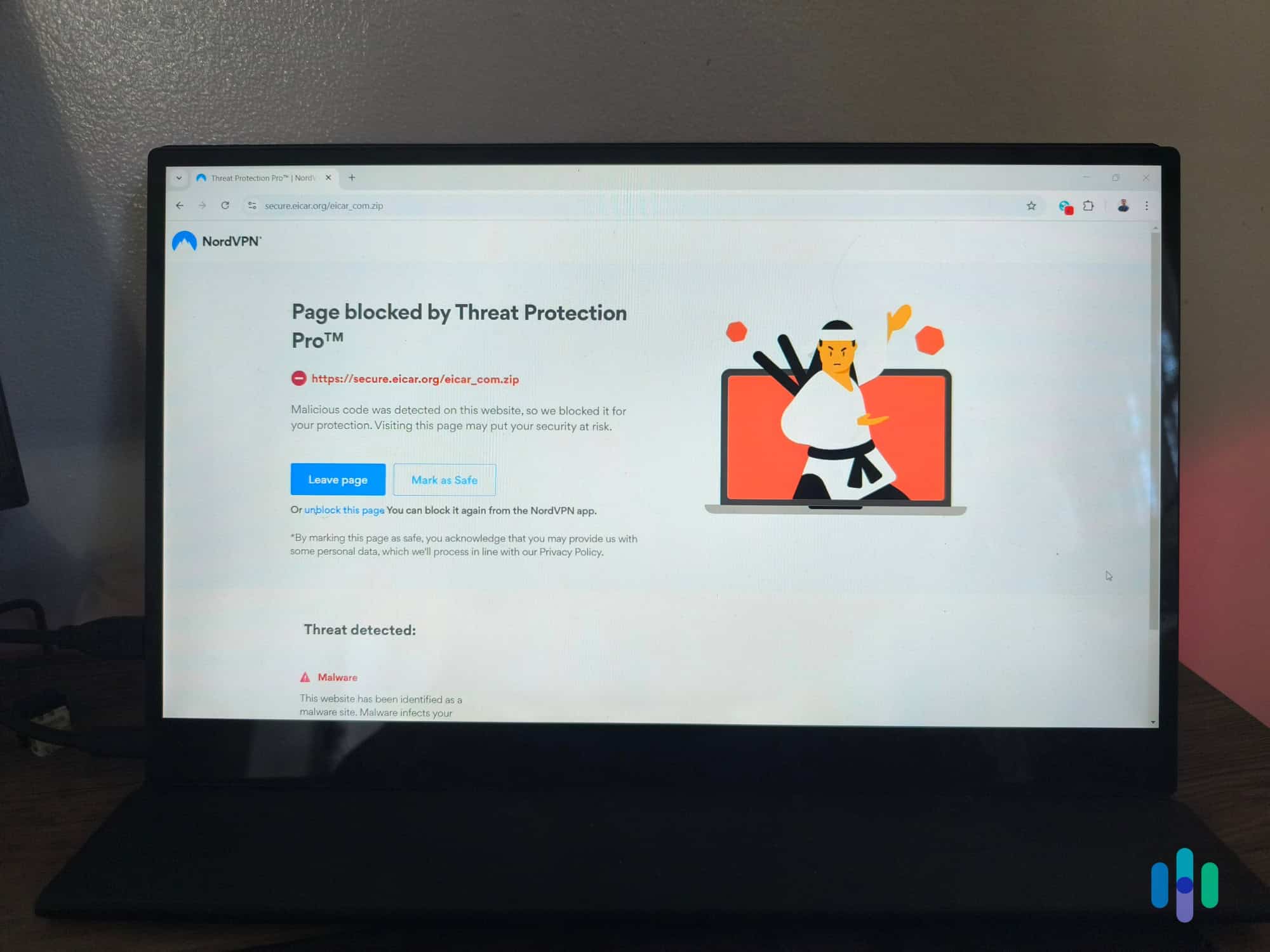
That said, Surfshark’s bundles aren’t bad, either. It stands out because of the inclusion of the Surfshark antivirus. Unlike NordVPN’s Threat Protection Pro that detects malware only from downloads and websites you visit, Surfshark’s antivirus is complete with malware protection features such as real-time protection. It’s one of the best antivirus software of 2025. And because Surfshark is also one of the best VPNs, we consider Surfshark One as the best VPN and antivirus bundle.
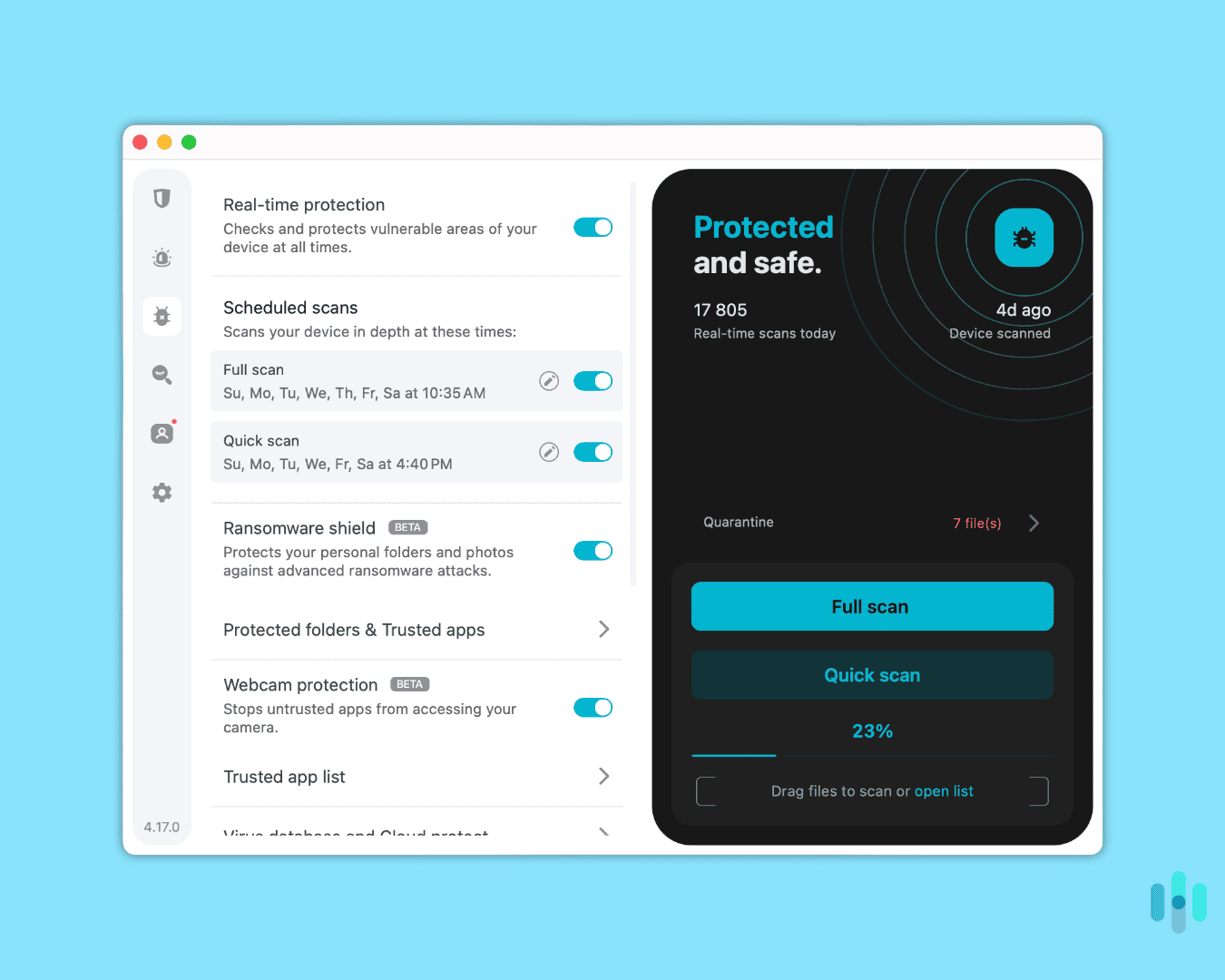
We also like that Surfshark Alert is included in Surfshark One. While it’s not as comprehensive as NordVPN’s identity protection — it doesn’t offer insurance coverage or credit monitoring — it could be more than enough for users concerned about their data exposure online. And if that’s not enough, the top-tier bundle includes the Incogni data removal tool we tested. This automated service requests the removal of your personal information from data brokers and people search sites.
>> Read More: What Are Data Removal Services?
Final Thoughts
There’s no doubt that Surfshark and NordVPN are great VPNs in their own right. After putting them both to the test, we decided we liked NordVPN more, but that doesn’t mean it’s definitely the better option for you.
You really can’t go wrong with either VPN, but you can use our findings to decide which is better. And once you do, head over to our Surfshark review or NordVPN review for a more detailed look at what you can expect from each VPN.
Frequently Asked Questions
-
Are Surfshark and NordVPN owned by the same company?
Even though Surfshark and NordVPN entered a merger agreement, they still operate as separate companies. The merger makes it easier for both companies to share information for improving each of their services. They do not share servers and their product development remains separate.
-
What are the main differences of Surfshark and NordVPN?
NordVPN has a wider reach in terms of its server network, as it spans 118 countries as opposed to Surfshark’s 100 countries. We also saw better upload speeds from NordVPN and a more reliable unblocking ability. We also noticed that NordVPN has more comprehensive security features. Meanwhile, Surfshark is more affordable and it has a full-featured antivirus. On top of that, Surfshark subscriptions allow unlimited connections, while NordVPN has a 10-device limit.
-
What does it mean that Surfshark and NordVPN have independently audited ‘no-logs’ policies?
VPNs have privacy policies that highlight what types of data they log and don’t log. No-log VPNs typically don’t log web activities, but as users, we have no way of verifying the truthfulness of the privacy policy. Surfshark and NordVPN have both submitted their privacy policies to independent firms for verification and auditing, and as a way to prove their trustworthiness.
-
How many servers do Surfshark and NordVPN operate?
Surfshark has over 3,200 servers in 100 countries, while NordVPN has over 7,200 servers in 118 countries. Both have a vast network of servers, but NordVPN has a better network overall.
-
What does NordVPN’s device limit mean and how does it compare to Surfshark’s unlimited connections?
NordVPN’s 10-device limit means you can only connect up to 10 devices to the VPN at a time, but you can install the VPN app on as many devices as you own. Surfshark, on the other hand, lets you install the VPN app on all your devices and connect any number of them at the same time.
-
Pew Research Center. (2020). Key takeaways on Americans’ views about privacy, surveillance and data-sharing.
pewresearch.org/fact-tank/2019/11/15/key-takeaways-on-americans-views-about-privacy-surveillance-and-data-sharing/ -
US Bureau of Labor Statistics. (2020). American Time Use Survey Summary.
bls.gov/news.release/atus.nr0.htm -
BitTorrent. (2020). About BitTorrent.
bittorrent.com/company/about-us/



